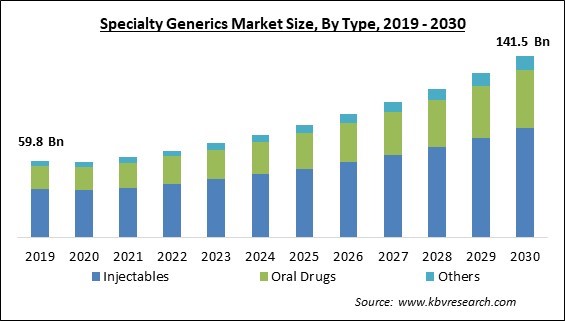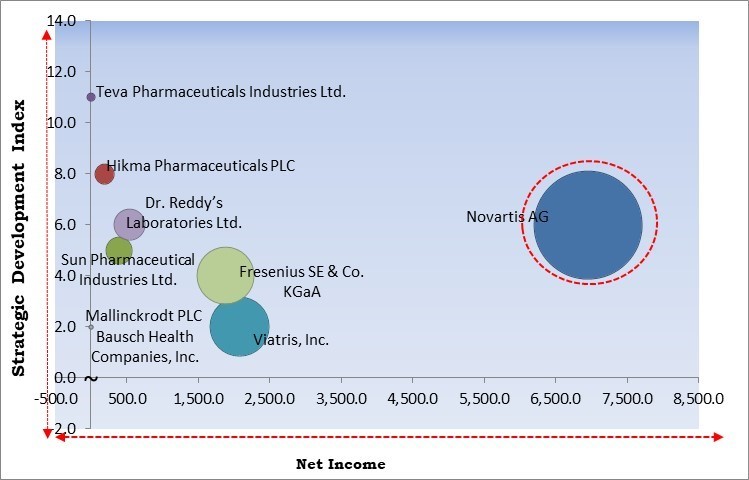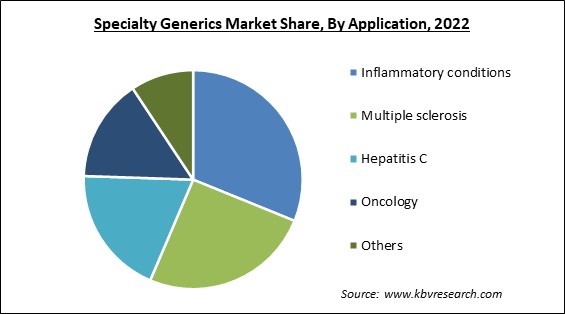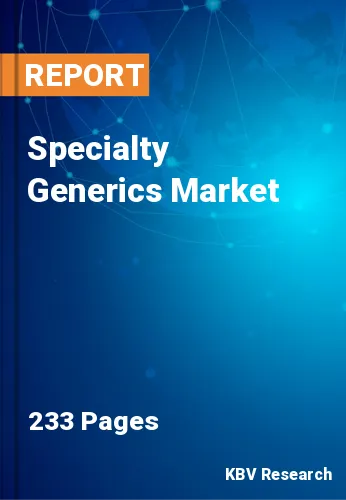The Global Specialty Generics Market size is expected to reach $141.5 billion by 2030, rising at a market growth of 9.8% CAGR during the forecast period.
Oncology is one of the major application specialty generics, thereby, it generated $10,292 million revenue in the market in 2022. Cancer will be the primary cause of nearly 10 million deaths in 2020, or close to one in every six. About 30% of cancer cases in low- and lower-middle-income nations are caused by cancer-causing diseases such as the human papillomavirus (HPV) and hepatitis. Many cancers are curable if caught early and treated successfully, but due to the adoption of a Western lifestyle, heavy alcohol and tobacco use, bad dietary habits, and lack of physical activity. The market is expected to see increased demand as cancer cases rise.

The major strategies followed by the market participants are Product Launches as the key developmental strategy to keep pace with the changing demands of end users. For instance, In January, 2023, Sun Pharmaceutical Industries rolled out the generic version of palbociclib, a breast cancer medication by Pfizer. The launch would be under the brand name Paleno, which would address the treatment requirements of several advanced breast cancer patients in India. Additionally, In July, 2022, Dr Reddy's Laboratories announced the launch of the generic version Bortezomib for Injection, the medication of Velcade brand. The product launch can be used for the treatment of certain types of cancer across the US market. The product can be delivered in a 3.5 mg per 10 mL single-dose vial presentation for subcutaneous.
Based on the Analysis presented in the KBV Cardinal matrix; Novartis AG are the forerunners in the Market. In September, 2020, Novartis collaborated with the African Union through the Africa Medical Supplies Platform. This collaboration would enhance the supply of medicines from the Novartis Pandemic Response offering to the AU member states and Caricom countries. Companies such as Viatris, Inc., Dr. Reddy’s Laboratories Ltd., Teva Pharmaceuticals Industries Ltd., Fresenius SE & Co. KGaA and Hikma Pharmaceuticals PLC are some of the key innovators in the Market.

The WHO reports that people are living longer overall. The majority of people today likely plan to live until their sixties and beyond. By 2030, one in six people will be 60 years of age or older. 1.4 billion people will be above the age of 60 by this time, up from 1 billion in 2020. By 2050, there will be 2.1 billion people in the globe who are 60 years of age or older. According to projections, there will be 426 million individuals who are 80 years of age or older by the year 2050. By 2050, low- and middle-income countries will be home to two-thirds of the world's over-60 population. The need for specialty generics will rise as people live longer and endure more severe problems like chronic illnesses and cancer.
The increasing number & size of investments invested in the healthcare industry by governments of different nations is one of the primary drivers of the market's growth. The WHO reports that healthcare spending reached a record high of US $9 trillion (about 11% of global GDP) due to substantial increases in healthcare spending by governments at all income levels. In general, rising government health spending largely offsets declining personal spending. Increasing spending in the healthcare industry has led to an increase in market innovations. The market is expanding as a result of increased investment in the healthcare industry.
Due to their complexity or distinctive delivery methods, specialty generics may need more regulatory attention. These items may require expensive and time-consuming regulatory approval. Market entrance delays and regulatory obstacles can prevent the market from expanding. Specialty generics might not cleanly fit into current legislative or approval processes. In order to handle these complicated items, regulatory bodies may need to modify their regulations or create new procedures. This might delay the launch of specialty generics by making the approval process take longer and creating more uncertainty for producers.
On the basis of type, the market is classified into injectables, oral drugs and others. In 2022, the injectables segment dominated the market with the maximum revenue share. The segment's growth can be ascribed to the advantages of injectables, such as their quick absorption and long-lasting effects, which increase patient compliance and acceptability. Drug therapies known as specialty injectable generics are available as generics and are utilized to treat chronic conditions that must be administered via infusion, injection, or inhalation. It has the same active ingredients as the branded versions of it and includes biologics that are used to treat various medications.
Based on application, the market is segmented into oncology, inflammatory conditions, multiple sclerosis, hepatitis C, and others. The hepatitis C segment recorded a remarkable revenue share in the in 2022. Most hepatitis C infections result from exposure to blood from risky injection techniques, unscreened blood transfusions, risky medical procedures, injecting drugs, and sexual behaviors that expose one to blood. Around 1.5 million new cases of the hepatitis C virus are reported each year, with an estimated 58 million people worldwide carrying the infection. According to estimates, 3.2 million children and adolescents worldwide have chronic hepatitis C infection.

By end use, the market is fragmented into specialty pharmacy, retail pharmacy, and hospital pharmacy. In 2022, the specialty pharmacy segment witnessed the largest revenue share in the market. Because specialty pharmacies have low distribution costs and convenient access to medications, major specialty generic manufacturers & insurance companies choose them for product distribution. In addition, in comparison to branded products, specialty generic drug inventory's low cost offers a better return on investment. Maximizing patient access, timely delivery, and efficient distribution management of specialty pharmacies all draw consumers to them and thus contribute to the expansion of this market segment.
| Report Attribute | Details |
|---|---|
| Market size value in 2022 | USD 67.9 Billion |
| Market size forecast in 2030 | USD 141.5 Billion |
| Base Year | 2022 |
| Historical Period | 2019 to 2021 |
| Forecast Period | 2023 to 2030 |
| Revenue Growth Rate | CAGR of 9.8% from 2023 to 2030 |
| Number of Pages | 233 |
| Number of Table | 374 |
| Report coverage | Market Trends, Revenue Estimation and Forecast, Segmentation Analysis, Regional and Country Breakdown, Competitive Landscape, Companies Strategic Developments, Company Profiling |
| Segments covered | Type, Application, End Use, Region |
| Country scope | US, Canada, Mexico, Germany, UK, France, Russia, Spain, Italy, China, Japan, India, South Korea, Singapore, Malaysia, Brazil, Argentina, UAE, Saudi Arabia, South Africa, Nigeria |
| Growth Drivers |
|
| Restraints |
|
Region wise, the market is analyzed across North America, Europe, Asia Pacific, and LAMEA. In 2022, the North American region led the market by generating the highest revenue share in the market. This is due to the existence of regulatory policies that are favorable to the approval of innovative products. The American FDA has launched several attempts to streamline the entire approval procedure. Therefore, the major producers continuously work to commercialize specialty generic medicines on the market.
Free Valuable Insights: Global Specialty Generics Market size to reach USD 141.5 Billion by 2030
The market research report covers the analysis of key stake holders of the market. Key companies profiled in the report include Teva Pharmaceuticals Industries Ltd., Novartis AG, Hikma Pharmaceuticals PLC, Sun Pharmaceutical Industries Ltd., Fresenius SE & Co. KGaA, Dr. Reddy’s Laboratories Ltd., Mallinckrodt PLC, Bausch Health Companies, Inc., Viatris, Inc. and Apotex, Inc.
By Type
By Application
By End Use
By Geography
The Market size is projected to reach USD 141.5 billion by 2030.
Growing ageing population are driving the Market in coming years, however, Regulatory challenges impeding market growth restraints the growth of the Market.
Teva Pharmaceuticals Industries Ltd., Novartis AG, Hikma Pharmaceuticals PLC, Sun Pharmaceutical Industries Ltd., Fresenius SE & Co. KGaA, Dr. Reddy’s Laboratories Ltd., Mallinckrodt PLC, Bausch Health Companies, Inc., Viatris, Inc. and Apotex, Inc.
The Inflammatory conditions segment is leading the Global Specialty Generics Market by Application in 2022 thereby, achieving a market value of $41.3 billion by 2030.
The North America market dominated the Global Specialty Generics Market by Region in 2022, and would continue to be a dominant market till 2030; thereby, achieving a market value of $50.4 billion by 2030.
Our team of dedicated experts can provide you with attractive expansion opportunities for your business.

